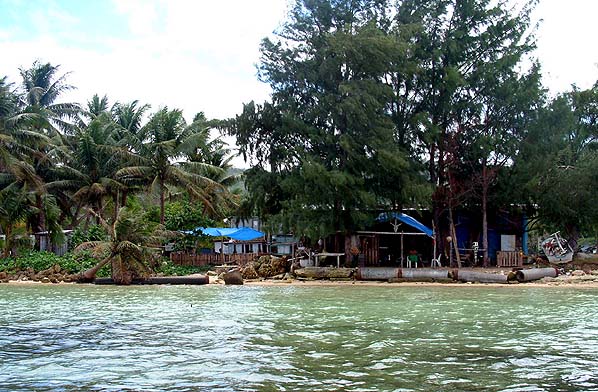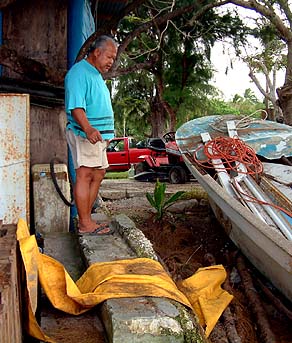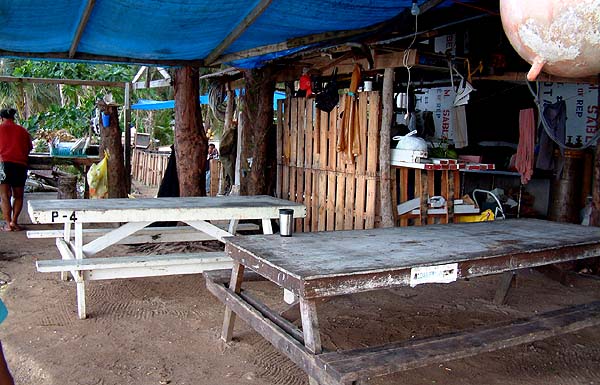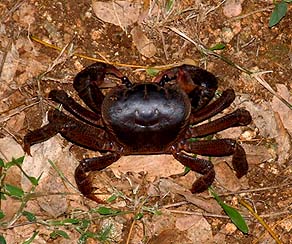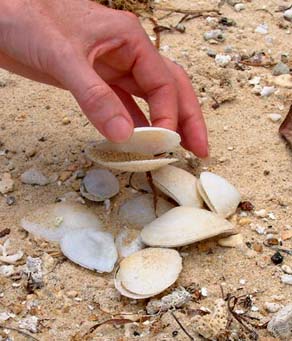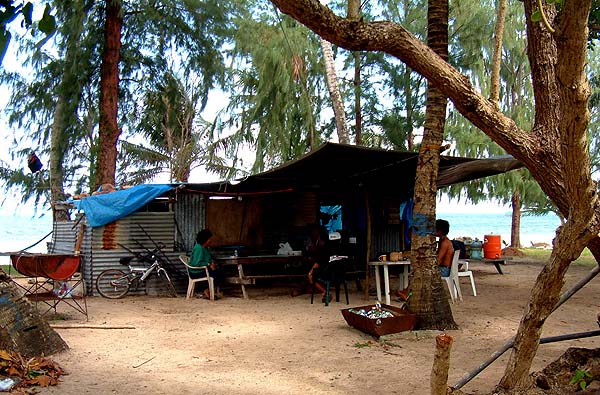 |
 |
 |
|||||
|
|
|
|
|
|
|
|
|
|
|
|||||||
|
|
|
|
Mickey's place, the seaside center for the Remar clan.
|
|
“We have two distinct ethnic populations,” Ben points out. “We have the Chamorro and we have the Carolinian. The Carolinians prefer the beach site because they are fishing people. They don’t want to traverse 30 to 40 minutes because they would be carrying their fishing equipment. If you live by the beach, you’re right next to your fishing area, but the Chamorros like to farm. Farming around this area is not very good, so they would rather go inland where there are big trees. They can build their shelter there and they spend nights or weekends there, and plant and harvest. That’s a difference between us.”
|
||
|
|
||
“Where Mickey’s living by the sea today with his family is actually public property, and it’s run by our clan, the Remar clan. Mickey is there primarily as a right hand man to the Chief. He’s first cousin to Vic, and Vic needs help all the time. Since I built my house here, I can’t be with him on a moment’s notice, or on a moment’s requirements, and so Mickey’s there and he helps out tremendously. Mickey’s part of the clan. “In the early days it was actually a men’s house. That’s where we would build or repair our canoes or any thing related to the ocean and fishing. Men will get together and talk about the fish weirs, or talk about some naughty young children whose parents they should call there and say, ‘Look, this is disrupting the community.’ It’s a very important location for us."
|
|
|
"However, after the War, those utt, or meeting houses, were destroyed. And it took a heck of a long time for the community to request for a meeting house, and when the military helped us build one, it was a Quonset, a giant Elephant Quonset. "And then here comes Typhoon Karen and Typhoon Jean—and that’s a beachfront property, so it’s wide open for heavy winds and heavy surf—and both the wind and the surf destroyed that place."
|
|
|
|
The meeting house by day.
|
"We are blessed by this location, because from Achugao all the way down to Puntan Flores, we have these land crabs. We call them panglao tunis and panglao echong. There are only two kinds that we eat here. And we got a lot of them here."
|
||
|
|
||
"We harvest these crabs during full moon. Actually, we do it a day before the full moon, but those that don’t know think that they come out during full moon, and so we get more crabs a day before full moon than those people who go out during the full moon. We catch them by the sack full, and bring them home. "We catch them strictly by hand, and sometimes by feeling. W use another method during the rainy season. Then the crabs’ holes will be inundated with water, and they come out and stand outside their holes, and we catch them there."
|
Land crab.
|
Beach crab.
|
"I remember my first time catching crab was using a torch. We tied up the dry coconut fronds very tight, and we would light that and go and look for coconut crab. A flashlight was a new thing in the village, and if we saw somebody with a flashlight, we were really envious. You know, back then, we didn’t understand the process how this thing had real light shining. Of course, later on down the line, everybody got their own flashlight. “Those were the fun days when we would go down with a plastic sack or a copra sack and catch crabs and bring them home. If we caught two sacks full of crabs we would take one sack and raise them. You grate coconut and give it to them, and they become tastier that way. More oily. Others, we would just boil them right there and crack out the meat. It’s a very long process to eat. But very good. We ate a lot of crabs."
|
|
|
|
“I would also do crab hunting,” Noel says. “Beach and land crab. There’s a beach crab that will eventually become a land crab. They’ll be born in the beach, they will put out all of the eggs for the male to fertilize and then move inland. But then, as they get older, this crab will start to change in body and start going inland. We also collect those and eat them.” "We gathered clams, small clams," Ben says,"the ones in the sea grass. They’re white. We’d just sift the sand with our hands and we’d dig down in the sand and collect large numbers of them and bring them home. We’d put them in a bucket or some containers for them to take out the mud and whatever is in them, and later on boil them or use grated coconut and make soup out of the big clams."
|
|
|
“My sister’s an expert on clamming on the beach,” Rosa Tenorio states. “Her name is Ann Perry and, actually, she had to show me a couple of times how to dig clam because I kind of lost touch. We still do it. High tide, low tide, doesn’t matter. "Low tide is better," Rosa's sister says, "but sometimes high tide is good too because all you do is go in and just move your hands around, right on top of the sand underneath the water. "The clams are small," Rosa continues. "They’re a little bit over a the size of a quarter. But they're very good cooked in coconut milk and about a cup of rice. It’s like clam chowder."
|
|
|
|
|
We learned from the outset that few houses remain by the sea. Rosa Tenorio and her family maintain the seaside tradition. “There’s always been a house on this particular spot," Rosa says, "but Typhoon Jean came in and everything that was sitting on the beach side, houses and all, were gone. The ocean actually came in, wiping everything down, and the ocean went as far in as the middle road there. All the way to the church. So that’s the reason why there are almost no houses on the beach anymore."
|
||
|
|
||
“My mom’s house, which is just that cement block there, was built for her. And then another typhoon came on the day they were going to give her a housewarming. It just tore the whole thing down. Everything was all done. Linoleum laid, everything." "Then the day of housewarming, a typhoon blew it back down to nothing. They never rebuilt it. They decided, ‘Okay, enough is enough.’ We’re going to leave it for a picnic area.” "Life by the sea here in Tanapag Village, I guess it’s paradise. What else can I say but paradise?"
|
|
|
|
|
| Rosa's seaside home brings us to a discussion of Tanapag's beaches.
|
||
|
|
||
|
|
|
|
|
|

|
| Tanapag Home | Map Library | Site Map | Pacific Worlds Home |
|
|
|
|

|
|
|
|||
| Copyright 2003 Pacific Worlds & Associates • Usage Policy • Webmaster |
|||
